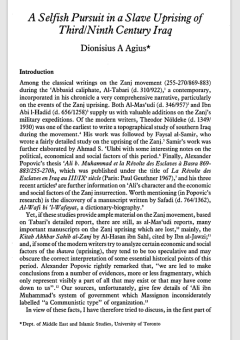Among the classical writings on the Zanj movement (255-270/869-883)during the ‘Abbasid caliphate, Al-Tabari (d. 310/922),1 a contemporary,incorporated in his chronicle a very comprehensive narrative, particularlyon the events of the Zanj uprising. Both Al-Mas’udi (d. 346/957)2 and IbnAbi 1-Hadid (d. 656/1258)3 supply us with valuable additions on the Zanj’smilitary expeditions. Of the modern writers, Theodor Noldeke (d. 1349/1930) was one of the earliest to write a topographical study of southern Iraqduring the movement.4 His work was followed by Faysal al-Samir, whowrote a fairly detailed study on the uprising of the Zanj.5 Samir’s work wasfurther elaborated by Ahmad S. ‘Ulabi with some interesting notes on thepolitical, economical and social factors of this period.6 Finally, AlexanderPopovic’s thesis ‘AH b. Muhammad et la Revoke des Esclaves a Basra 869-883/255-270h, which was published under the title of La Revoke desEsclaves en Iraq au IIIIIX’ siecle (Paris: Paul Geuthner 1967),7 and his threerecent articles8 are further information on ‘Ali’s character and the economicand social factors of the Zanj insurrection. Worth mentioning (in Popovic’sresearch) is the discovery of a manuscript written by Safadi (d. 764/1362),Al-Wafi bi ‘l-Wafayat, a dictionary-biography.9Yet, if these studies provide ample material on the Zanj movement, basedon Tabari’s detailed report, there are still, as al-Mas’udi reports, manyimportant manuscripts on the Zanj uprising which are lost,10 mainly, theKitab Akhbar Sahib al-Zanj by Al-Hasan ibn Sahl, cited by Ibn al-Jawzi;11and, if some of the modern writers try to analyze certain economic and socialfactors of the ihawra (uprising), they tend to be too speculative and mayobscure the correct interpretation of some essential historical points of thisperiod. Alexander Popovic rightly remarked that, “we are led to makeconclusions from a number of evidences, more or less fragmentary, whichonly represent visibly a part of all that may exist or that may have comedown to us”.12 Our sources, unfortunately, give few details of ‘Ali ibnMuhammad’s system of government which Massignon inconsideratelylabelled “a Communistic type” of organization.13





